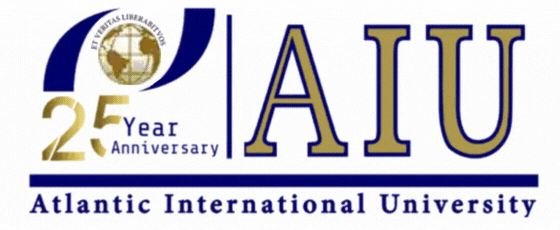- RESEARCHDistance Learning at AIU is enhanced by vast academic resources and innovative technologies build into the Virtual Campus: Hundreds of self-paced courses with video lectures and step by step lessons, thousands of optional assignments, 140,000 e-books, the Social Media & Networking platform allowing collaboration/chat/communications between students, and MYAIU develop students holistically in 11 areas beyond just academics.
- PROGRAMS OFFERED
- Areas of Study
- Courses and Curriculum
- Open Courses
- Register for a Program
- Associate Program
- Associate in Addiction Counseling
- Associate in Agriculture Food And Resources
- Associate in Anti Terrorism Security
- Associate in Behavior Analysis In Special Education
- Associate in Bioethics
- Associate in Climatology
- Associate in Cultural Theological Communication
- Associate in Culinary Arts
- Associate in Ecotechnology
- View all Associates Programs
- Bachelor Program
- Bachelors in Community Development
- Bachelors in Environmental Science
- Bachelor in Education (B.Ed, BS)
- Bachelors in Economics
- Bachelors in Entrepreneurship
- Bachelors in Financial Administration
- Bachelors in Human Resource Management
- Bachelors in Linguistics
- Bachelors in Nutritional Science
- Bachelors in Occupational Health and Safety
- Bachelors in Psychology
- View all Bachelor Programs
- Doctorate Program
- Doctor | of Biology (PhD)
- Doctorate in Business Administration (DBA, PhD)
- Doctor of Economics (PhD)
- Doctor of Electrical Engineering (D.Sc, PhD)
- Doctor of Finance (PhD)
- Doctorate in International Relations
- Doctorate in Information Technology (D.Sc)
- Doctor of Legal Studies (PhD)
- Doctor of Project Management (PhD)
- Doctor of Sociology (PhD, D.Sc)
- Doctorate in Sustainable Natural Resources Management
- View all Doctorate Programs
- Master Program
- Postdoctoral Program
- Postdoctoral in Animal Science
- Postdoctoral in Anti Terrorism Security
- Postdoctoral in Behavior Analysis In Special Education
- Postdoctoral in Bioethics
- Postdoctoral in Blockchain Technology and Digital Currency
- Postdoctoral in Business Management
- Postdoctoral in Cloud Computing
- Postdoctoral in Computer Engineering
- View all Postdoctoral Programs
AIU offers a wide range of majors in areas including the Arts, Business, Science, Technology, Social, and Human studies. More than 120 degrees and programs are available for adult learners at the associate’s, bachelor’s, master’s, doctoral and postdoctoral level. - VIRTUAL CAMPUS
Distance Learning at AIU is enhanced by vast academic resources and innovative technologies build into the Virtual Campus: Hundreds of self-paced courses with video lectures and step by step lessons, thousands of optional assignments, 140,000 e-books, the Social Media & Networking platform allowing collaboration/chat/communications between students, and MYAIU develop students holistically in 11 areas beyond just academics.
- ALUMNI
The world is YOUR campus!”, that is the message of AIU’s month magazine Campus Mundi. Hear the voices and see the faces that make up AIU. Campus Mundi brings the world of AIU to you every months with inspirational stories, news and achievements by AIU members from around the world (students and staff are located in over 200 countries).
Constructivism and Student-Centered Learning
Exploring Constructivism in Education: Principles and Practices
The document discusses constructivism as an educational theory emphasizing knowledge construction through interaction and experience. It highlights key contributors like Piaget, Vygotsky, and Montessori, and explores concepts such as the Zone of Proximal Development and multiple intelligences, advocating for student-centered learning and collaborative teaching strategies in classrooms.

The document titled “Constructivism and Student-Centered Learning” by Hyppolite-Jean provides an in-depth exploration of constructivism as a pivotal educational theory that emphasizes the active role of learners in constructing knowledge through their experiences and interactions.
Key Concepts of Constructivism:
- Definition and Origins: Constructivism is presented as a multifaceted concept that has evolved over time, with roots tracing back to philosophers like Socrates and psychologists such as Jean Piaget and Lev Vygotsky. It posits that learning is a process of creating meaning, where students actively engage with new information based on their prior knowledge.
- Cognitive and Social Constructivism: The essay distinguishes between cognitive constructivism, which focuses on individual knowledge construction, and social constructivism, which emphasizes the importance of social interactions in the learning process. Vygotsky’s Social Development Theory, particularly the Zone of Proximal Development, is highlighted as crucial for understanding how community and collaboration enhance learning.
- Influential Theorists: The document discusses several key figures in the development of constructivist thought:
- Jean Piaget: Known for his systematic study of cognitive development.
- Lev Vygotsky: Introduced the concept of the Zone of Proximal Development, emphasizing the role of social interaction in learning.
- Carl Rogers: Advocated for a humanistic approach to education, focusing on learner-centered principles.
- John Lave and Etienne Wenger: Developed the concept of Communities of Practice, where individuals learn through shared experiences.
- Maria Montessori: Contributed to constructivism through her scientific pedagogy and child-centered educational practices.
- Constructivist Teaching Strategies: The essay emphasizes the need for educators to adopt constructivist teaching strategies that foster cognitive and social development. Teachers are encouraged to act as facilitators, guiding students to connect new knowledge with their existing understanding. This approach promotes critical thinking, collaboration, and active engagement in the learning process.
- Educational Implications: The document argues for the integration of constructivist principles in modern educational systems, suggesting that such an approach can significantly enhance both teaching and learning outcomes. It highlights the importance of understanding students’ current knowledge levels to effectively implement constructivist strategies.
- Assessment and Learning Frameworks: The essay also touches on the evolution of educational assessment frameworks, such as Bloom’s Taxonomy and its revised version, which align with constructivist principles by focusing on dynamic cognitive processes rather than static objectives.
In conclusion, the document advocates for the continued application of constructivist thought in educational practices, asserting that it provides a robust framework for fostering meaningful learning experiences. By emphasizing collaboration, social interaction, and the active role of learners, constructivism is positioned as a highly effective method for enhancing educational outcomes in diverse learning environments.
Atlantic International University
Get to know the AIU experience
Contact Us Today!
We understand how busy adults do not have time to go back to school. Now, it’s possible to earn your degree in the comfort of your own home and still have time for yourself and your family. The Admissions office is here to help you, for additional information or to see if you qualify for admissions please contact us. If you are ready to apply please submit your Online Application and paste your resume and any additional comments/questions in the area provided.
Pioneer Plaza
900 Fort Street Mall 905
Honolulu, HI 96813
800-993-0066 (Toll Free in US)
808-924-9567 (Internationally)
808-947-2488 (Fax)
AIU Success Stories







Contact Us Today!
Begin Your Journey!
AIU’s Summer of Innovation and Growth gives you the ability to earn up to $5000 in tuition credit by completing free lessons and courses.
Whether you’re looking to acquire new skills, advance your career, or simply explore new interests, AIU is your gateway to a world of opportunities. With free access to 3400 lessons and hundreds of courses the ability to earn credits and earn certificates there’s no better time to start learning.
Join us today as a Guest Student and take the first step towards a brighter, more empowered future.
Explore. Learn. Achieve.
Degrees

Contact Us
Atlantic International University
900 Fort Street Mall 905 Honolulu, HI 96813 info@aiu.edu
Quick Links
Home | Online Courses | Available Courses | Virtual Campus | Career Center | Available Positions | Ask Career Coach | The Job Interview | Resume Writing | Accreditation | Areas of Study | Bachelor Degree Programs | Masters Degree Programs | Doctoral Degree Programs | Course & Curriculum | Human Rights | Online Library | Representations | Student Publication | Sponsors | General Information | Mission & Vision | School of Business and Economics | School of Science and Engineering | School of Social and Human Studies | Media Center | Admission Requirements | Apply Online | Tuition | Faculty & Staff | Distance Learning Overview | Student Testimonials | AIU Blogs | Register for Program | Privacy Policy | FAQ



















